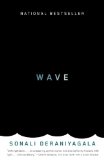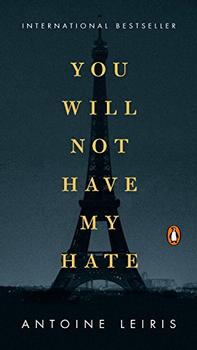Summary | Excerpt | Reviews | Beyond the book | Read-Alikes | Genres & Themes | Author Bio

Wave is a primer on desolation and remembrance. Sonali Deraniyagala's hypnotic and wrenching account of receiving and surviving a near-lethal blow to the spirit is also a beautiful memorial to the husband, sons, and parents the author lost to the December 26, 2004 tsunami in Sri Lanka.
Deraniyagala, staying with her family in a seafront hotel, begins with the dreamlike appearance of the wave, "...not receding or dissolving...rushing past the conifers and coming closer to our room..." She calls to her husband, and they grab their boys and run. The family crowds into a jeep while Deraniyagala reassures herself that her parents, still inside the hotel, will be safe, even imagining her father, his pants rolled up, navigating the puddles:
"The water was rising now, filling the jeep...Steve and I lifted the boys as high as we could. Steve held Vik, I had Mal. Their faces above the water, the tops of their heads pressing against the jeep's canvas hood, our hands tight under their armpits. The jeep rocked. It was floating now…Then I saw Steve's face. I'd never seen him like that before. A sudden look of terror, eyes wide open, mouth agape…I didn't have time to turn around and look."
Stunned and in pain, Deraniyagala grabs a tree branch and emerges sullen and empty in an alien, "knocked-down world": "Whenever I recognized someone from the hotel, I thought...'Why are they alive, surely that wave should have got them as well. Why aren't they dead?'" For the first half-year after the tsunami, Deraniyagala drifts in a suicidal fog, fighting to save herself from drowning in the waves of grief, anger and shame that follow. She attempts to "teach herself the impossible" - to acknowledge the reality of her loss, only to be overcome by anguish when she does: "I was terrified of everything because everything was from that life. Anything that excited them, I wanted destroyed. I panicked if I saw a flower. Malli would have stuck it in my hair."
But, with the support of family and friends, Deraniyagala doesn't fall, and begins a slow and painful ascent into a new life:
"There were all those first times. The first time I came downstairs in my aunt's house frightened, knowing I wouldn't see a heap of shoes by the front door…The first time I walked on a Colombo street and couldn't bear to glimpse a child, a ball. The first time I visited a friend and was nearly physically sick. Steve and I had been here with the boys just weeks before, my children's fingerprints were on her wall…"
Memory is the source of Deraniyagala's sharpest suffering - "The more I remember, the greater my agony" - and disorientation. Yet as Wave moves farther from the moment of the tsunami, remembered joy becomes a source of strength and Deraniyagala's lost family becomes heartbreakingly alive for the reader.
The experience of reading tumultuous and beautiful Wave is like the Zen proverb that advises, "Let go over a cliff, die completely, and then come back to life - after that you cannot be deceived." Because Deraniyagala's focus is unwaveringly internal, the reader barely comes up for air or gets a glimpse of her external world of jobs, places, and events (including memorials to her family). The author supplies very little information about her professional life either before or after the tsunami, and it is only in the acknowledgments that we learn about the help and encouragement she received from her therapist. The memoir is both a memento mori and an elegy, a lasting monument to the lost. Read Wave and you will never forget Vik, Malli and Steve, or that love is indelible and loss is inevitable.
About the Author
Dr. Sonali Deraniyagala, born in Sri Lanka, is a professor of Economics at Columbia University in New York and at London University. Her husband, Steve Lissenburgh, 40 when he died in 2004, was a social scientist and economist who worked in London. Their sons, Vikram and Nikhil (Malli), were 7 and 5 when they perished. In their memory, the boys' school raised funds that were used to refurbish the Yala National Park Museum. The family was visiting Yala, in southern Sri Lanka, when the wave hit. The author also lost her parents, Gemini and Edward Deraniyagala, in the disaster.
The author discusses Wave in the video below:
![]() This review was originally published in The BookBrowse Review in May 2013, and has been updated for the
January 2014 edition.
Click here to go to this issue.
This review was originally published in The BookBrowse Review in May 2013, and has been updated for the
January 2014 edition.
Click here to go to this issue.

If you liked Wave, try these:

by Allison Pataki
Published 2019
A deeply moving memoir about a young couple whose lives were changed in the blink of an eye, and the love that helped them rewrite their future.

by Antoine Leiris
Published 2017
This inspirational and heartbreaking memoir shows the power of love as a young father finds himself suddenly caring for his son alone after his wife is killed in the Paris attacks.
Our wisdom comes from our experience, and our experience comes from our foolishness
Click Here to find out who said this, as well as discovering other famous literary quotes!
Your guide toexceptional books
BookBrowse seeks out and recommends the best in contemporary fiction and nonfiction—books that not only engage and entertain but also deepen our understanding of ourselves and the world around us.